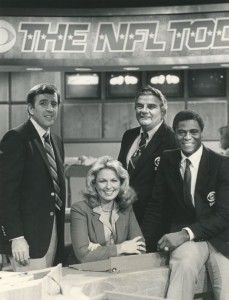You Are Looking Live – Remembering the Career of Brent Musburger

There was Brent Musburger on the far left sitting with Joe Namath poolside prior to Super Bowl III.
Part of the memory for all sports fans are the faces and voices of the announcers and commentators who have helped connect us with great sports moments. As someone whose first memories of television sports include watching the NFL Today during the 1970s, Brent Musburger is one of those figures for me. His catch phrase of “You are looking live” still makes me excited and indicates that I better pay attention because something big could be about to happen. The announcement this week that the 77-year-old Musburger will be retiring from play-by-play duty on January 31st will leave a void in the sports world, but he has provided generations of fans with some great memories.
A graduate of the Northwestern University Medill School of Journalism, Musburger began his career in the late 1960s and very quickly found himself in the middle of the action and controversy.
Writing for Chicago’s American newspaper, Musburger covered the 1968 Olympics and the controversial “black power” salute by Olympians Tommie Smith and John Carlos. In the article, he stated that “Smith and Carlos looked like a couple of black-skinned storm troopers” who were “ignoble,” “juvenile,” and “unimaginative.” Years later Musburger said that comparing the two athlettes to Nazis was “harsh”, but stood by his opinion that the Olympic stage was not the appropriate place to make a political statement.
Just a few months later, Musburger found himself poolside in Miami as one of a handful of reporters sitting with a brash young quarterback who was holding court before Super Bowl III. As it turned out, Joe Namath was just the first of many Super Bowl heroes with whom Musburger would rub elbows.
Beginning in 1968, Musburger was first a radio and then television anchor for WBBM in Chicago. He later moved to Los Angeles where he was a news co-anchor at KNXT (now KCBS-TV) and worked alongside Connie Chung.
In 1973 Musburger began serving as a play-by-play announcer for NFL games on CBS – his color commentating partners included Bart Starr, Tommy Mason and Wayne Walker – and two years later was given the role that would make him famous.

The NFL Today team of Musburger, Phyllis George, Jimmy “The Greek” Snyder and Irv Cross was groundbreaking for the 1970s.
Though it is a format that is familiar today when all the pregame shows are a combination of substance and entertainment, when the NFL Today began in 1975, it was a pregame show unlike anything that had been on television previously. While Musburger served as the lead anchor, it was the addition of former NFL player Irv Cross, former Miss America Phyllis George and noted bookie Jimmy “The Greek” Snyder that made the show interesting. Often, Musburger was as much a traffic cop or air traffic controller as he was show host.
Interestingly enough, on occasion it was Musburger who needed a referee. In 1980 he and Snyder got into a brief fist-fight in a New York bar. The two made fun of the incident on the show the next week, but it added to a tension that made the show quite interesting to watch.
For the next 15 years, Musburger was the sports face for CBS. In addition to his pregame duties, Musburger served as a play-by-play announcer for the NBA Finals, NCAA Men’s Basketball Tournament, college football and many other programs that were on CBS.
Among his most famous moments during this era was announcing Magic Johnson’s amazing performance in game six of the 1980 NBA Finals and calling Doug Flutie’s Hail Mary pass that lifted Boston College over the University of Miami on Thanksgiving weekend in 1984.
Musburger’s tenure with CBS ended in April of 1990 when he was fired on the morning in which he announced the 1990 NCAA Championship game between Duke and UNLV. His departure was quite a surprise for a generation of sports fans who were accustomed to seeing and hearing Musburger during major sporting events.
It didn’t take long for him to resurface with ABC. With Al Michaels already entrenched as the top announcer for ABC, Musburger focused on college football and basketball. He teamed with Dick Vermeil to call major college football games before the former coach returned to the NFL sidelines in 1997. Following the retirement of Keith Jackson, Musburger became the lead college football broadcaster for ABC and called seven BCS National Championship Games.
Following on the heels of the retirement of Verne Lundquist and Chris Berman in recent months, the departure of Musburger will further reduce the number of familiar faces and voices for longtime sports fans. However, as I am sure Musburger would agree, the story has always been the games and not the announcers, so it is time for a the next generation of announcers to build on the legacy of those who have come before.
Below are links to some YouTube videos that feature Musburger on the NFL Today and as a play-by-play voice.
All are getting better and informative educational methods and topics always for the live news and tips. Everyone can get more and informative topics always for the great live news and updates as well.